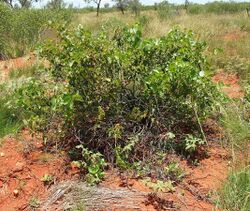Biology:Ipomoea costata
| Ipomoea costata | |
|---|---|

| |
| Scientific classification | |
| Kingdom: | Plantae |
| Clade: | Tracheophytes |
| Clade: | Angiosperms |
| Clade: | Eudicots |
| Clade: | Asterids |
| Order: | Solanales |
| Family: | Convolvulaceae |
| Genus: | Ipomoea |
| Species: | I. costata
|
| Binomial name | |
| Ipomoea costata Benth.[1]
| |
Ipomoea costata, commonly known as rock morning glory, is an Australian native plant.[2] It is found in northern Australia, from Western Australia, through the Northern Territory, to Queensland.[3] Its tubers provide a form of bush tucker to some Aboriginal peoples, known as bush potato,[4] or (to the Ngururrpa groups in WA), karnti.[5]
Description
It is a prostrate or climbing perennial growing up to 3 m high, with purple-blue-pink flowers from February to November.[2] Juvenile form is a vine, maturing into a woody-stemmed shrub with vine-like stems. Leaves are broad and leathery, 4-9 cm long.[4] Tubers are rounded, 12-20 cm long by 5-18 cm wide, with a single plant potentially having up to twenty tubers.[6]
Habitat
It occurs on sandy or rocky soils, often over limestone,[2] and on spinifex sand plains in northern Australia.[4]
Uses
It is the source of bush potato, a bush tucker food for Aboriginal people.[4] Bush potatoes are cooked on the warm earth under coals, and are peeled when cooked.[6]
Aboriginal names
In Central Australia, I. costata is also known to Aboriginal people by the following names:[7]
- Alyawarr: anaty
- Anmatyerr: anaty or anek
- Eastern Arrernte: anatye
- Western Arrernte: natye
- Pintupi: ala or yala
- Warlpiri: karnti or paparda
References
- ↑ "Ipomoea costata". Australian Plant Census. https://biodiversity.org.au/nsl/services/apc-format/display/111605.
- ↑ 2.0 2.1 2.2 Grazyna Paczkowska (8 November 1996). "Ipomoea costata Benth. Rock Morning Glory". Western Australian Herbarium. https://florabase.dpaw.wa.gov.au/browse/profile/6624.
- ↑ "Occurrence records". Atlas of Living Australia. https://avh.ala.org.au/occurrences/search?taxa=ipomoea+costata#tab_mapView.
- ↑ 4.0 4.1 4.2 4.3 Low, Tim (1991). Wild Food Plants of Australia. Angus & Robertson. p. 163. ISBN 0207169306.
- ↑ "New Ngururrpa Indigenous Protected Area". 1 August 2018. https://www.countryneedspeople.org.au/ngururrpa_indigenous_protected_area.
- ↑ 6.0 6.1 Isaacs, Jennifer (1991). Bush Food: Aboriginal food and herbal medicine. Ure Smith Press. p. 94. ISBN 0725408340.
- ↑ Vincent, Ange (July 2009). "Australian Bush Foods Information Sheet 6: Bush Potato Ipomoea costata & I polpha". Desert Knowledge CRC. http://www.desertknowledgecrc.com.au/resource/DKCRC_Bush%20Food_IS-6_Bush%20Potato_July09.pdf.
External links
Wikidata ☰ Q6065260 entry
 |

